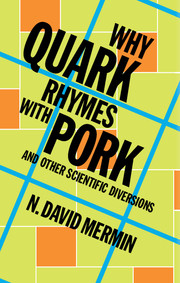Book contents
- Frontmatter
- Dedication
- Contents
- Preface
- Part One Reference Frame Columns, Physics Today 1988–2009
- Part Two Shedding Bad Habits
- Part Three More from Professor Mozart
- 34 What's wrong with this book, unpublished, 1992
- 35 What's wrong with these stanzas, Physics Today, July 2007
- Part Four More to be Said
- Part Five Some People I've Known
- Part Six Summing it Up
- Index
34 - What's wrong with this book, unpublished, 1992
from Part Three - More from Professor Mozart
Published online by Cambridge University Press: 05 January 2016
- Frontmatter
- Dedication
- Contents
- Preface
- Part One Reference Frame Columns, Physics Today 1988–2009
- Part Two Shedding Bad Habits
- Part Three More from Professor Mozart
- 34 What's wrong with this book, unpublished, 1992
- 35 What's wrong with these stanzas, Physics Today, July 2007
- Part Four More to be Said
- Part Five Some People I've Known
- Part Six Summing it Up
- Index
Summary
“Enter!” ordered Professor Mozart, as I knocked briskly on his door. Bracing myself against the ambience of stale Havana smoke, I walked in and got right to the point. “W. A., I've got a favor to ask you.” He looked up inquisitively. “As you know,” I continued, “I have now achieved a modicum of fame as a columnist with Physics Today.”
Mozart snorted derisively. He is not altogether pleased with my publishing our private conversations. “Because I am a columnist Physics Today has decided not to review my recent book of essays. I have thus been unable to bring it to the attention of my literary fans, except by the crude and low-density expedient of inserting advertising transparencies into all my public lectures.” His look of derision modulated to outright scorn, but I persisted. “W. A.—Bill—could you write a review of it?”
“Ha!” he offered.
“What does that mean?” I inquired, having learned not to be put off by Mozart's moments of withering contempt. “The book appeared before I invented you, so there's no conflict of interest.”
“The problem, my friend, is that I thought your book was dreadful.”
“That's not a problem,” I explained. “A hostile review will do just as well as a friendly one. The only point is to make my readers aware of the book; they'll judge for themselves. But only one book review has appeared in the entire United States, in an obscure journal of physics pedagogy. Most people don't even know the book exists. Even an unsympathetic review will bring it to their attention and an attack so vicious that it sets them talking would be just what's needed.”
“It won't work,” he protested. “Physics Today doesn't even print Letters to the Editor from nonexistent people, so there's no way they'd do an entire book review.”
“Ah, but they might in a Reference Frame column,” I pointed out, “particularly if the review is negative. So you can pillory me to your heart's content, and still do me a favor. How can you resist!”
A wicked gleam came into his eye. “I'll do it!” he declared, and a week later a manuscript slid under my door which I reproduce verbatim below.
- Type
- Chapter
- Information
- Why Quark Rhymes with PorkAnd Other Scientific Diversions, pp. 251 - 256Publisher: Cambridge University PressPrint publication year: 2016



